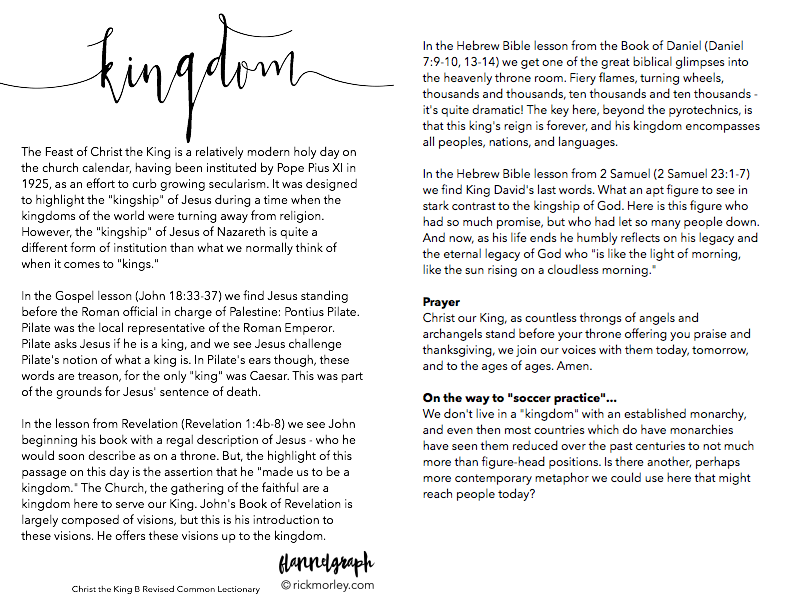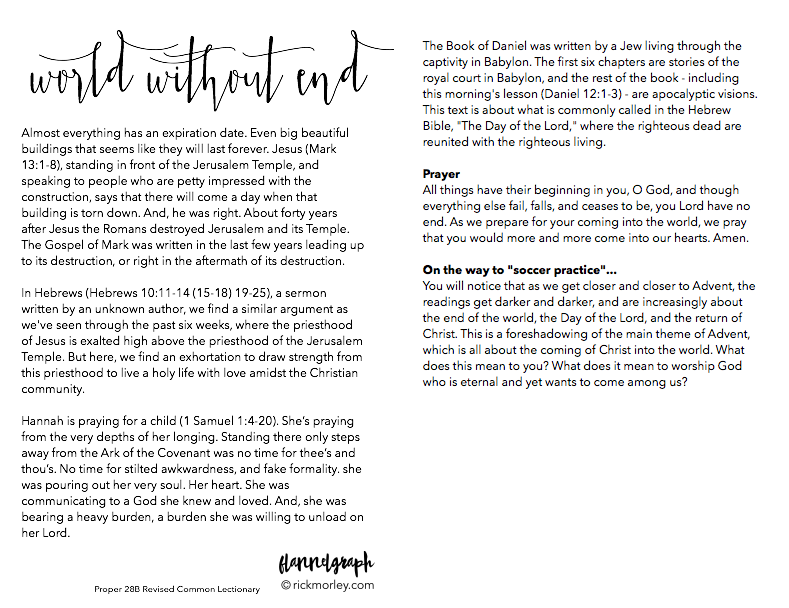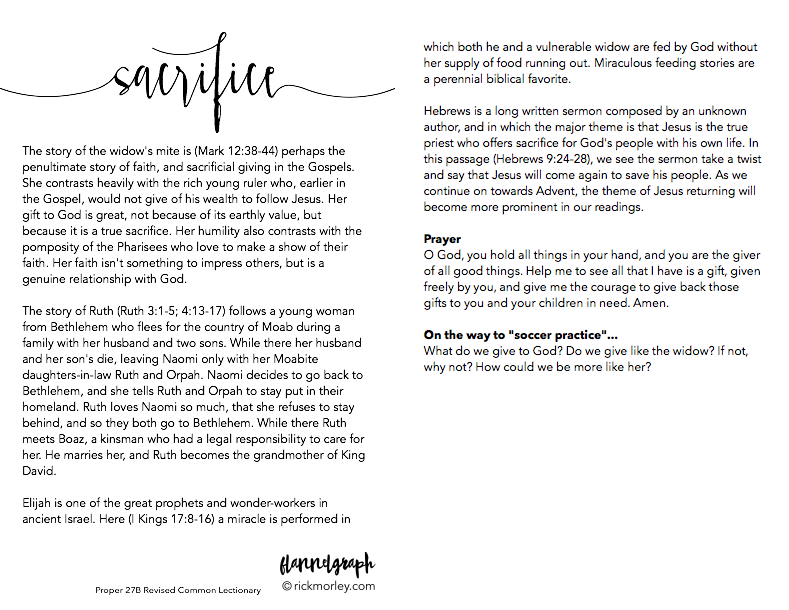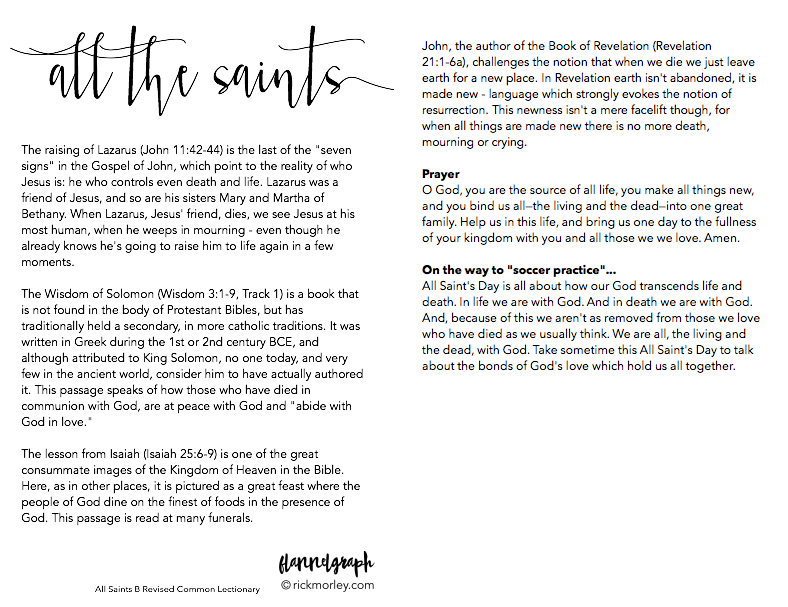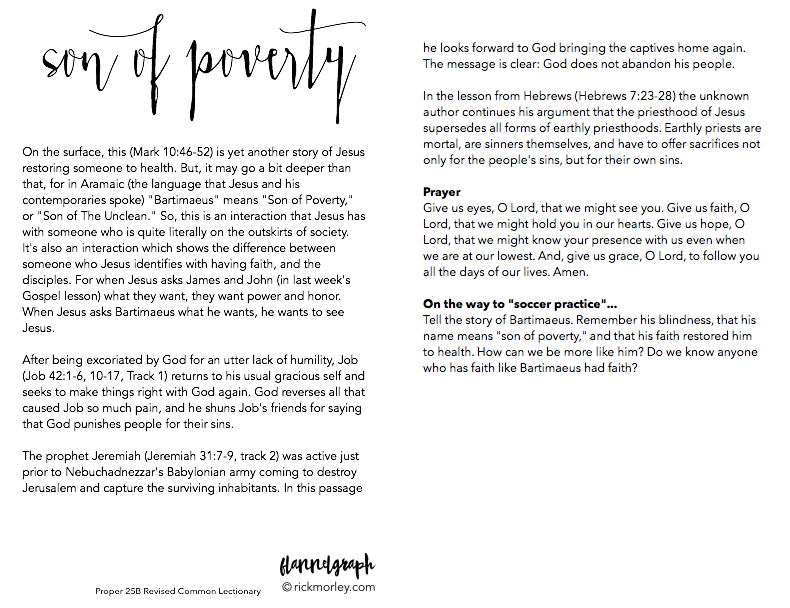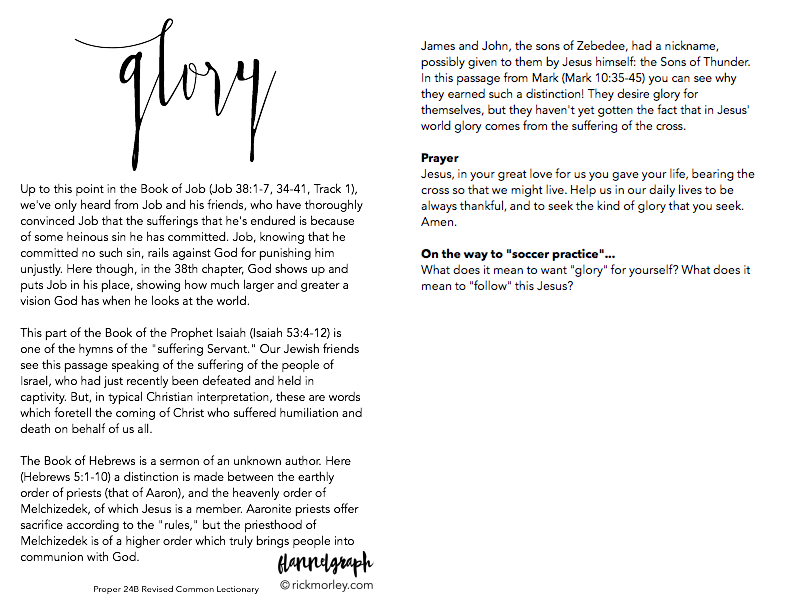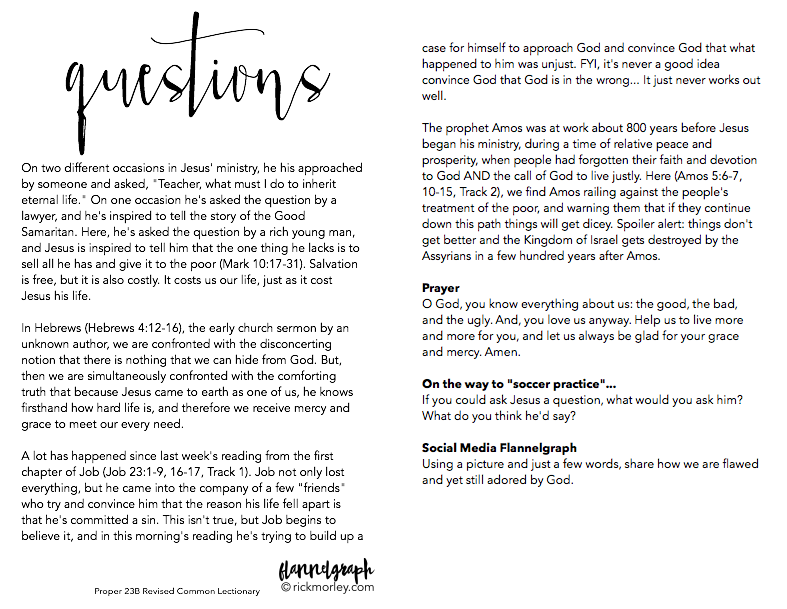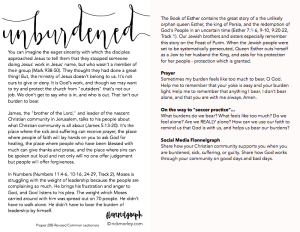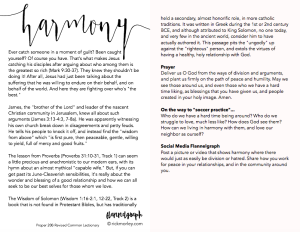flannelgraph proper 28b
flannelgraph proper 27b
flannelgraph all saints year b
flannelgraph proper 25b
flannelgraph proper 24b
flannelgraph proper 23b: the Sunday closest to October 12
flannel graph proper 22b, Sunday closest to October 5
A hard Gospel lesson today for many people (Mark 10:2-16). Two things about it: First, God takes the bond and covenant of marriage seriously. As the marriage liturgy says, “it is not to be entered into unadvisedly or lightly.” The spiritual union of marriage represents the union between God and God’s People. A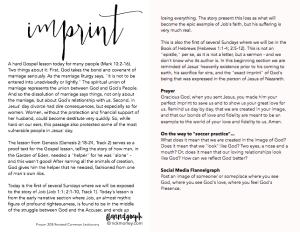 nd so the dissolution of marriage says things, not only about the marriage, but about God’s relationship with us. Second, in Jesus’ day divorce had dire consequences, but especially so for women. Women, without the protection and financial support of her husband, could become destitute very quickly. So, while hard on our ears, this passage also protected some of the most vulnerable people in Jesus’ day.
nd so the dissolution of marriage says things, not only about the marriage, but about God’s relationship with us. Second, in Jesus’ day divorce had dire consequences, but especially so for women. Women, without the protection and financial support of her husband, could become destitute very quickly. So, while hard on our ears, this passage also protected some of the most vulnerable people in Jesus’ day.
The less
on from Genesis (Genesis 2:18-24, Track 2) serves as a proof text for the Gospel lesson, telling the story of how man, in the Garden of Eden, needed a “helper” for he was “alone” – and this wasn’t good! After naming all the animals of creation, God gives him the helper that he needed, fashioned from one of man’s own ribs.
Today is the first of several Sundays where we will be exposed to the story of Job (Job 1:1; 2:1-10, Track 1). Today’s lesson is from the early narrative section
where Job, an almost mythic figure of profound righteousness, is found to be in the middle of the struggle between God and the Accuser, and ends up losing everything. The story present this loss as what will become the epic example of Job’s faith, but his suffering is very much real.
This is also the first of several Sundays where we will be in the Book of Hebrews (Hebrews 1:1-4; 2:5-12). This is not an “epistle,” per se, as it is not a letter, but a sermon – and we don’t know who its author is. In this beginning section we are reminded of Jesus’ heavenly existence prior to his coming to earth, his sacrifice for sins, and the “exact imprint” of God’s being that was expressed in the person of Jesus of Nazareth.
Prayer
Gracious G
od, when you sent Jesus, you made him your perfect imprint to save us and to show us your great love for us. Remind us day by day, that we are created in your image, and that our bonds of love and fidelity are meant to be an example to the world of your love and fidelity to us. Amen.
On the way to “soccer practice”…
What does it mean that we are created in the image of God? Does it mean that we “look” like God? Two eyes, a nose and a mouth? Or, does it mean that our loving relationships look like God? How can we reflect God better?
Social Media Flannelgraph
Post an image of someone/ or someplace where you see God, where you see God’s love, where you feel God’s Presence.
flannelgraph proper 21b, Sunday closest to September 28
You can imagine the eager sincerity with which the disciples approached Jesus to tell them that they stopped someone doing Jesus’ work in Jesus’ name, but who wasn’t a member of their group (Mark 938-50). They thought they had done a great thing! But, the ministry of Jesus doesn’t belong to us. It’s not ours to give or deny. It is God’s work, and though we may want to try and protect the church from “outsiders” that’s not our job. We don’t get to say who is in, and who is out. That isn’t our burden to bear.
James, the “brother of the Lord,” and leader of the nascent Christian community in Jerusalem, talks to his people about what Christian community is all about (James 5:13-20). It’s the place where the sick and suffering can receive prayer, the place where people of faith will lay hands on you to ask God for healing, the place where people who have been blessed with much can give thanks and praise, and the place where sins can be spoken out loud and not only will no one offer judgement but people will offer forgiveness.
In Numbers (Numbers 11:4-6, 10-16, 24-29, Track 2), Moses is struggling with the weight of leadership because the people are complaining so much. He brings his frustration and anger to God, and God listens to his plea. The weight which Moses carried around with him was spread out on 70 people. He didn’t have to walk alone. He didn’t have to bear the burden of leadership by himself.
The Book of Esther contains the great story of a the unlikely orphan queen Esther, the king of Persia, and the redemption of God’s People in an uncertain time (Esther 7:1-6, 9-10, 9:20-22, Track 1). Our Jewish brothers and sisters especially remember this story on the Feast of Purim. When the Jewish people were set to be systematically persecuted, Queen Esther outs herself as a Jew to her husband the King, and asks for his protection for her people – protection which is granted.
Prayer
Sometimes my burden feels like too much to bear, O God. Help me to remember that your yoke is easy and your burden light. Help me to remember that anything I bear, I don’t bear alone, and that you are with me always. Amen.
On the way to “soccer practice”…
What burdens do we bear? What feels like too much? Do we feel alone? Are we REALLY alone? How can we use our faith to remind us that God is with us, and helps us bear our burdens?
Social Media Flannelgraph
Share how your Christian community supports you when you are burdened, sick, suffering, or guilty. Share how God works through your community on good days and bad days.
flannelgraph proper 20b, Sunday closest to September 21
Ever catch someone in a moment of guilt? Been caught yourself? Of course you have. That’s what makes Jesus catching his disciples after arguing about who among them is the greatest so rich (Mark 9:30-37). They knew they shouldn’t be doing it! After all, Jesus had just been talking about the suffering that he was willing to endure on their behalf, and on behalf of the world. And here they are fighting over who’s “the best.”
James, the “brother of the Lord” and leader of the nascent Christian community in Jerusalem, knew all about such arguments (James 3:13-4:3, 7-8a). He was apparently witnessing his own church break down in disagreements and petty feuds. He tells his people to knock it off, and instead find the “wisdom from above” which “is first pure, then peaceable,
gentle, willing to yield, full of mercy and good fruits.”
The lesson from Proverbs (Proverbs 31:10-31, Track 1) can seem a little precious and anachronistic to our modern ears, with its hymn about an almost mythical “capable wife.” But, if you can get past its June-Cleaverish sensibilities, it’s really about the wonder and blessing of a good relationship and how we can all seek to be our best selves for those whom we love.
The Wisdom of Solomon (Wisdom 1:16-2:1, 12-22, Track 2) is a book that is not found in Protestant Bibles, but has traditionally held a secondary, almost honorific role, in more catholic traditions. It was written in Greek during the 1st or 2nd century BCE, and although attributed to King Solomon, no one today, and very few in the ancient world, consider him to have actually authored it. This
passage pits the “ungodly” up against the “righteous” person, and extols the virtues of having a healthy, holy relationship with God.
Prayer
Deliver us O God from the ways of division and arguments, and plant us firmly on the path of peace and humility. May we see those around us, and even those who we have a hard time liking, as blessings that you have given us, and people created in your holy image. Amen.
On the way to “soccer practice”…
Who do we have a hard time being around? Who do we struggle to love, much less like? How does God see them? How can we living in harmony with them, and love our neighbor as ourself?
Social Media Flannelgraph
Post a picture or video that shows harmony where there would just as easily be division or hatred. Share how you work for peace in your relationships, and in the community around you.
